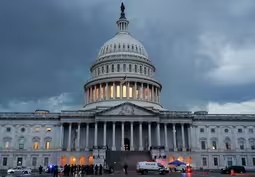
Tamara Keith and Amy Walter on impact of conflict with Iran
Clip: 6/23/2025 | 9m 15sVideo has Closed Captions
Tamara Keith and Amy Walter on the political impact of the conflict with Iran
NPR’s Tamara Keith and Amy Walter of the Cook Political Report with Amy Walter join Geoff Bennett to discuss the latest political news, including the political impact of the conflict with Iran and negotiations over the Republican budget bill.
Problems playing video? | Closed Captioning Feedback
Problems playing video? | Closed Captioning Feedback
Major corporate funding for the PBS News Hour is provided by BDO, BNSF, Consumer Cellular, American Cruise Lines, and Raymond James. Funding for the PBS NewsHour Weekend is provided by...

Tamara Keith and Amy Walter on impact of conflict with Iran
Clip: 6/23/2025 | 9m 15sVideo has Closed Captions
NPR’s Tamara Keith and Amy Walter of the Cook Political Report with Amy Walter join Geoff Bennett to discuss the latest political news, including the political impact of the conflict with Iran and negotiations over the Republican budget bill.
Problems playing video? | Closed Captioning Feedback
How to Watch PBS News Hour
PBS News Hour is available to stream on pbs.org and the free PBS App, available on iPhone, Apple TV, Android TV, Android smartphones, Amazon Fire TV, Amazon Fire Tablet, Roku, Samsung Smart TV, and Vizio.
Providing Support for PBS.org
Learn Moreabout PBS online sponsorshipGEOFF BENNETT: For more on the political impact of the conflict with Iran and negotiations over the Republican budget bill, we are joined by our Politics Monday duo.
That's Amy Walter of The Cook Political Report With Amy Walter and Tamara Keith of NPR.
Always great to see you both.
AMY WALTER, The Cook Political Report: Good to be here.
GEOFF BENNETT: So, the situation with Iran, this is a fluid, fast-moving situation.
Just this evening, President Trump announced a cease-fire between Israel and Iran, one that he hopes will become permanent.
J.D.
Vance, the vice president, on FOX News said that the U.S. had severely degraded Iran's nuclear program, which has been a goal, Tam, of successive U.S. presidents.
We don't know what we don't know.
TAMARA KEITH, National Public Radio: Right.
GEOFF BENNETT: We don't know how Iran will respond to all of this.
But the White House will certainly spin this as a success.
TAMARA KEITH: Certainly.
And it is interesting that J.D.
Vance sort of dodged the question of whether the U.S. got the uranium supplies or where the uranium even is.
There are still a lot of questions about the success of this mission.
But President Trump has been saying that he wants peace.
And he is now announcing, and still a lot of details to work through, he is announcing a cease-fire.
He is already naming the war that he says will be the 12-day war that will be over.
So President Trump has been declaring victory at every turn since Saturday night, when he said that Iran's nuclear program was totally obliterated.
Again, we don't know if that's fully true.
But if there is a cease-fire, President Trump can once again say that he is the peace president.
He had said he was going to be the peace candidate.
He had said that no wars under him.
And for several days here, it looked like he had gone back on a campaign promise.
Now, if this holds, he can say, look, peace through strength.
I did it.
GEOFF BENNETT: To Tam's point, the president ran against involving the U.S. in foreign wars.
The administration was saying before this evening that this wasn't a war with Iran, that this was a war, to quote J.D.
Vance, against Iran's nuclear program, that this was a limited and precise operation.
Still, I mean, what political risks does the president face here?
AMY WALTER: Yes, well, the political risks are pretty clear, that we really don't know a lot about what the next steps are going to be.
This is obviously a very volatile part of the world that we're talking about with the Middle East.
But I do think the challenge for Donald Trump has long been trying to keep this coalition together of folks like Lindsey Graham, who are very much interventionists, as well as people like a Steve Bannon, who believe very strongly in the no further involvement of Americans overseas.
He's kept that coalition together in this moment, thanks in part to its success.
This was a successful mission.
You're right.
We don't know what's going to come next.
We don't know how much uranium was and how much of the centrifuge was damaged.
But we do know that every person who was involved in this mission came back safely.
We do know that the bombs were dropped accurately.
That is a success.
And that's a pretty easy way to keep your coalition happy is to succeed.
GEOFF BENNETT: The Democrats who are saying that President Trump exceeded his war powers, that this was really a prerogative of the Congress, the Republicans, the few of them who are questioning the intelligence used since the DNI back in March said that Iran was not on a path to a nuclear weapon, does any of that shape the White House's decision-making going forward?
TAMARA KEITH: I don't think it shapes the White House's decision-making going forward.
The president, which is a required formality, sent a notification to Congress today that he -- that this mission had been undertaken.
And he said he was doing it under his constitutional authority.
Under his constitutional authority is a phrase we have heard a lot with the Trump administration, and his administration has an expansive view of his executive authority and his constitutional authority.
I don't think that that is going to change.
And, also, we should just be clear that members of Congress have from time to time complained about presidents going beyond what they believe they should be doing, using authorizations for the use of military force that are deeply outdated.
The fact is Congress has not asserted its authority here.
It just simply hasn't since the lead-up to the Iraq War.
And most of the time, members of Congress are kind of OK with it.
They won't necessarily publicly say that, but the votes that they took to authorize the Iraq War have haunted members of Congress, have haunted American politicians ever since then.
And so they haven't been forced to take difficult votes because they haven't asserted their authority in this area.
AMY WALTER: Yes.
GEOFF BENNETT: Well, in the time that remains, let's talk about this budget bill.
This is the vehicle for most of President Trump's domestic agenda.
And the most contentious issue right now, Amy, are these Medicaid cuts.
Where is public opinion on this?
And what's the risk facing Republicans?
AMY WALTER: Well, the overall opinion about the bill, there were a number of polls that came out the other week.
And just in looking through them, what you find is opposition to this legislation writ large is much higher than support for it.
And that's really driven by two things, committed and intense opposition by Democrats and sort of tepid approval by Republicans.
It's not that Republican voters don't like it.
They just don't like it as much as Democrats dislike it.
Now, driving a lot of that, I think, is the fact that Republicans have been at odds internally about how far to go on things like these cuts.
And so they have really not had a message to give to their base.
Democrats have one very clear message, and that is, this is going to kick people off of Medicaid who need it.
That message right now is winning the day.
What we learned actually today is that a number of Republican groups are actually up with advertising in some of these key battleground districts and states focusing attention on the tax cuts.
So this is what we're going to see, Geoff, for the next few months here is, who wins this fight?
Is it going to be a fight about -- is it going to be defined by Medicaid cuts?
Or is it going to be defined, as Republicans would like it to be defined, which is actually, no, this is a bill that's going to help you, average taxpayer, get some money back.
And, for now, Democrats are winning that fight.
GEOFF BENNETT: And it appears that the GOP intended cuts and changes to the food stamp program, the SNAP program, are on the chopping block because of a procedural issue.
Meantime, there are conservatives who say this bill doesn't go far enough overall.
Will they be able to get this across the finish line by this July 4 deadline that the president has instituted?
TAMARA KEITH: Yes, there are a lot of mathematical challenges that they're facing.
However, in terms of the political math, when it comes down to it, this one big, beautiful bill, as the president has dubbed it, contains essentially his entire domestic policy agenda for his presidency.
It includes money for immigration enforcement, and it includes money for the military, which he can point to this mission and say, look, we need this.
And it also includes these tax cuts, which, if it fails, taxes would go up, not by as much as he says, but taxes would go up.
And so in a lot of ways for Republicans, it is too big to fail, too important to fail.
They have to find a way to get to yes.
That is what the White House is betting on.
And they are insisting -- I talked to a White House official over the weekend who said, oh, no, we're really serious about this July 4 deadline, we want it on the president's desk.
I don't know how practical that is, especially given everything else that's happening this.
The president needs to be working the phones right now if he wants to get this through the Senate this week.
And he's working the phones also to the Middle East.
He has a lot on his plate.
But certainly the White House is going to push this and they're going to make it very painful for any Republicans who stray.
AMY WALTER: Well, and Republican leaders in Congress also want this done as quickly as possible.
The longer it stays out there, the harder it is to bring those votes in.
We all know that.
GEOFF BENNETT: Time is never on the side of bills like this.
AMY WALTER: Time is never your friend.
GEOFF BENNETT: Yes.
AMY WALTER: And the other is, they want time to be able to package and message this legislation.
As I said earlier, Democrats have been on the offense and have defined this bill from the get-go.
If you're a Republican, you're going into an election year, if you're in the House especially.
Many of you in the Senate are up for reelection as well.
You want to get ahead of this and get on top of it as quickly as you possibly can.
To wait until the fall is going to be tough.
GEOFF BENNETT: Amy Walter and Tamara Keith, thanks to you both, as always.
AMY WALTER: You're welcome.
TAMARA KEITH: You're welcome.
How Iran's response to U.S. signaled a desire to de-escalate
Video has Closed Captions
Clip: 6/23/2025 | 7m 35s | How Iran's response to U.S. strikes signaled a desire to de-escalate (7m 35s)
Murkowski on new memoir and adapting to Trump era politics
Video has Closed Captions
Clip: 6/23/2025 | 9m 22s | Sen. Murkowski on new memoir 'Far From Home' and adapting to Trump era politics (9m 22s)
News Wrap: Supreme Court allows deportations amid appeals
Video has Closed Captions
Clip: 6/23/2025 | 6m 12s | News Wrap: Supreme Court allows deportations of migrants to countries other than their own (6m 12s)
NYC mayoral primary could forecast the future for Democrats
Video has Closed Captions
Clip: 6/23/2025 | 8m 29s | New York City mayoral primary could forecast the future for Democrats (8m 29s)
Retired U.S. vice admiral analyzes Iran conflict
Video has Closed Captions
Clip: 6/23/2025 | 6m 50s | Retired U.S. vice admiral analyzes Iran conflict and what's next (6m 50s)
Some Republicans clash with Trump over Iran strikes
Video has Closed Captions
Clip: 6/23/2025 | 4m 37s | Some Republicans in Congress clash with Trump over Iran strikes (4m 37s)
Providing Support for PBS.org
Learn Moreabout PBS online sponsorshipSupport for PBS provided by:
Major corporate funding for the PBS News Hour is provided by BDO, BNSF, Consumer Cellular, American Cruise Lines, and Raymond James. Funding for the PBS NewsHour Weekend is provided by...

















